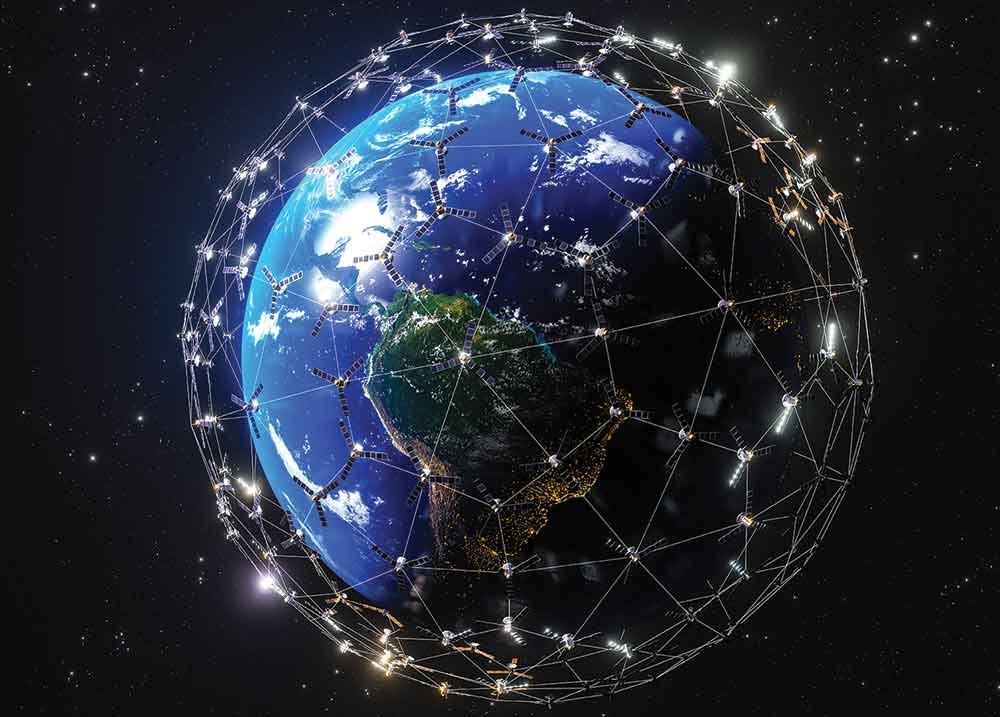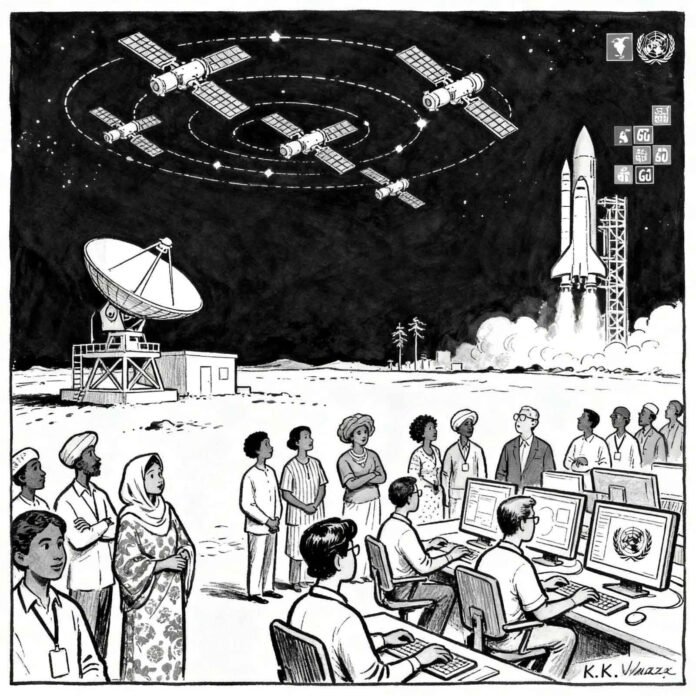Space is no longer the exclusive domain of a few major powers. The global space economy, projected to surpass US $1 trillion by the mid-2030s, now spans communication constellations, AI-driven earth observation (EO) -supporting governance and development initiatives besides military uses, maritime security and deep-space exploration.
For the Global South, space is not a matter of prestige but a vital tool for climate resilience, sustainable development, disaster management, security, and digital inclusion. However, despite representing more than half of the world’s population, the region continues to lag in upstream capabilities, while downstream applications remain fragmented and heavily reliant on established actors. Addressing these structural imbalances is essential to ensuring that space technologies effectively support the region’s development priorities and long-term growth.
A thoughtful strategy that combines policy innovation, investment, and space diplomacy is needed to transform the Global South from a peripheral user of space services into a co-architect of the space economy. Central to this transformation is the cultivation of equitable partnerships—both within the Global South and with established spacefaring nations—that promote technology transfer, capacity building, and joint ventures. India’s experience as a capable yet frugal space power, positions it as a natural catalyst for such collaborative frameworks for helping inclusive growth in the region.
Why the Global South Matters More Than Ever
Development and Security Imperatives
- Space-enabled solutions are increasingly integral to addressing critical priorities in the Global South, including food security, water resource management, climate resilience, disaster risk reduction, and border security.
- Rapid urbanisation and expanding economic activity across Africa and Asia demand reliable, persistent satellite data to support infrastructure planning, environmental monitoring, efficient resource allocation, and evidence-based governance.
Investing in education, training, and technical expertise is crucial for empowering local scientists, engineers, and entrepreneurs to participate meaningfully in space-related activities. Programmes such as satellite technology workshops, internships with space agencies, and online knowledge-sharing platforms can bridge the technical gap and expedite the creation of a skilled workforce in the Global South
Geographic and Environmental Assets
- Equatorial launch sites, located in countries such as Brazil, Kenya, Sri Lanka, India, Australia, and Indonesia, offer strategic advantages for space launches. Being near the equator allows rockets to take full advantage of the Earth’s rotational speed, reducing the amount of fuel needed to reach orbit. This can lower launch costs by an estimated 15-20%, making these sites a highly cost-effective complement to the more established Northern Hemisphere launch centers.
- Additionally, many regions of the Global South are among the most vulnerable to climate change, facing challenges such as rising sea levels, extreme weather events, and agricultural stress. This vulnerability creates both an urgent need for climate monitoring and creating adaptation solutions; by leveraging space-based capabilities. The Global South can not only improve local resilience but also contribute valuable insights to global climate adaptation efforts.
Strategic Balance
- Inclusion of Global South actors in satellite manufacturing, launch services, data analytics, and space governance can prevent over-concentration of capacity in a few advanced economies, enabling a more multipolar and resilient global order.
Policy Initiatives Driving Inclusion
Policy initiatives aimed at promoting inclusion in the space economy are essential not only for equity but also for fostering innovation, economic growth, and global collaboration. The inclusion of the Global South in the space economy requires a multi-pronged policy approach that emphasise capacity building, regional cooperation, inclusive financing, and active participation in global governance.
Regional collaboration is another critical strategy. Countries within the Global South can pool resources to establish joint space research centers, shared satellite networks, and regional regulatory frameworks. This approach not only reduces individual costs but also strengthens bargaining power in global space governance forums
Capacity Building and Education
- Investing in education, training, and technical expertise is crucial for empowering local scientists, engineers, and entrepreneurs to participate meaningfully in space-related activities. Programmes such as satellite technology workshops, internships with space agencies, and online knowledge-sharing platforms can bridge the technical gap and expedite the creation of a skilled workforce in the Global South. Existing efforts include Regional Centres for Space Science and Technology Education by United Nations Office for Outer Space Affairs (UNOOSA) – Centre for Space Science and Technology Education for Asia and the Pacific (CSSTEAP), hosted by ISRO, the UNNATI programme (UNispace Nanosatellite Assembly & Training) by ISRO and AfDev-Sat Training Programme led by the Egyptian Space Agency (EgSA) in Africa.
Regional Collaboration
- Regional collaboration is another critical strategy. Countries within the Global South can pool resources to establish joint space research centers, shared satellite networks, and regional regulatory frameworks. This approach not only reduces individual costs but also strengthens bargaining power in global space governance forums, ensuring that the interests of developing nations are represented. Establishment of the African Space Agency and the BRICS Space cooperation are the major initiatives taken in this direction.

Inclusive Financing Mechanisms
- Access to capital remains one of the most significant barriers for Global South participation in the space economy. Innovative financing approaches are essential to bridge this gap and enable meaningful investment in space infrastructure and technology. Public-private partnerships, international/multi-agency development funds, and concessional loans can facilitate creation of space infrastructure including manufacturing, research and technology development in the region.
Active Participation in Global Governance
- Active participation in global space governance ensures that Global South countries are active participants in shaping international norms. This includes engagement in treaties, guidelines on satellite frequency allocation, and space debris mitigation policies. By advocating for fair access and equitable regulations, nations can safeguard their interests in an increasingly
competitive environment.
The Power of Space Diplomacy and Partnerships
The South Asia Satellite (GSAT-9) exemplifies the Indian space diplomacy approach, providing regional public goods demonstrating how space technology can serve as both a development tool and a diplomatic instrument. By integrating space diplomacy into development and foreign policy, mutually beneficial partnerships can and must be created.
The South Asia Satellite (GSAT-9) exemplifies the Indian space diplomacy approach, providing regional public goods demonstrating how space technology can serve as both a development tool and a diplomatic instrument. By integrating space diplomacy into development and foreign policy, mutually beneficial partnerships can and must be created
Key Strategies for Strengthening Space Diplomacy and Partnerships
- Establish Space Manufacturing Hubs through International Collaboration: Promoting the creation of space manufacturing hubs via technology transfer and strategic investments—whether through North-South or South-South partnerships—can drive economic transformation, generate employment, and integrate countries into global supply chains.
- Develop Space Infrastructure, Leveraging Geographical Advantages: Capitalising on the unique geographical benefits of the Global South for space infrastructure development presents a mutually beneficial opportunity. Strategic placement of launch sites, ground stations, and other space assets can enhance operational efficiency, reduce costs, and foster regional collaboration in space endeavours.
- Integrate Space Cooperation with Development Priorities: Embedding space initiatives within broader developmental agendas ensures tangible benefits for the society. Applications in climate resilience, food security, disaster management, and maritime governance exemplify how space cooperation can be aligned with pressing national and regional priorities.
- Leverage Soft Power through Space-Derived Public Goods: Space services—including telecommunications, Earth observation, and navigation—can serve as instruments of goodwill, fostering regional integration and diplomatic engagement. By offering access to these services, nations can strengthen partnerships, enhance their global standing, and promote collaborative solutions to shared challenges.
Technical and Strategic Priorities for the Next Decade
Based on a government and industry-led model – A forward-looking strategy for Global South’s inclusion in the space ecosystem over the next decade must emphasise technology, innovation capacity, and complementary specialisations, rather than sheer volumes or satellite counts. Many emerging space nations have limited budgets and infrastructure; therefore, focusing on niche capabilities both upstream and downstream can accelerate their meaningful participation in global value chains.
Given the strategic recognition that space capabilities are essential for addressing the 21st-century development challenges, the Global South cannot be just a passive beneficiary of space services; it is a stakeholder with distinctive needs and capabilities
A useful reference point is the European model, where countries such as Germany, France, Italy, and smaller partners built specialised strengths—launchers, robotics, satellite payloads, propulsion, ground systems—under the umbrella of the European Space Agency (ESA), creating an integrated, interoperable capability. For the Global South, a similar approach—regionally distributed specialisations supported by shared R&D platforms, open standards, and collaborative innovation hubs—can foster sustainable growth and reduce duplication of effort, enabling these countries to become essential contributors to global space missions and services. Recommended focus areas are:
- EO Data for Resilience: EO data used for flood mapping, deforestation tracking, food-crop yield forecasting.
- Affordable Connectivity: LEO broadband and next-generation navigation to reduce digital divides.
- Manufacturing & Launch: Establishment of manufacturing hubs integrated into the global supply chains for small satellites and sub- systems and launching leveraging equatorial sites.
- Capacity-Building Networks: Establishment of Centres of Excellence, co-funded by multilateral agencies, to accelerate knowledge sharing and skill development. This will also facilitate leveraging innovation in creating local solutions for local problems.
From Beneficiaries to Co-Architects
Given the strategic recognition that space capabilities are essential for addressing the 21st-century development challenges, the Global South cannot be just a passive beneficiary of space services; it is a stakeholder with distinctive needs and capabilities. India’s example shows that cost-effective innovation, policy foresight, and active space diplomacy can transform emerging economies into credible space actors.
The Global South’s experience with resource constraints, environmental challenges, and social innovation provides crucial insights for developing space applications that are sustainable and scalable. For policymakers, and industry leaders, the challenge is to move beyond rhetoric towards frameworks that provide finance, partnerships and policies in ways that serve development and capability creation of the Global South in the global space ecosystem. Bringing the Global South to the heart of “Everything Space” is a strategic necessity for a stable, resilient, and prosperous planet.
The writer is a veteran with more than three decades of military service and a former UN peacekeeper. He has served in various military organisations related to Operations, and Space & Defence procurement. He is currently Vice President - Growth Operations at Dhruva Space. The views expressed are of the writer and do not necessarily reflect that of Raksha Anirveda







